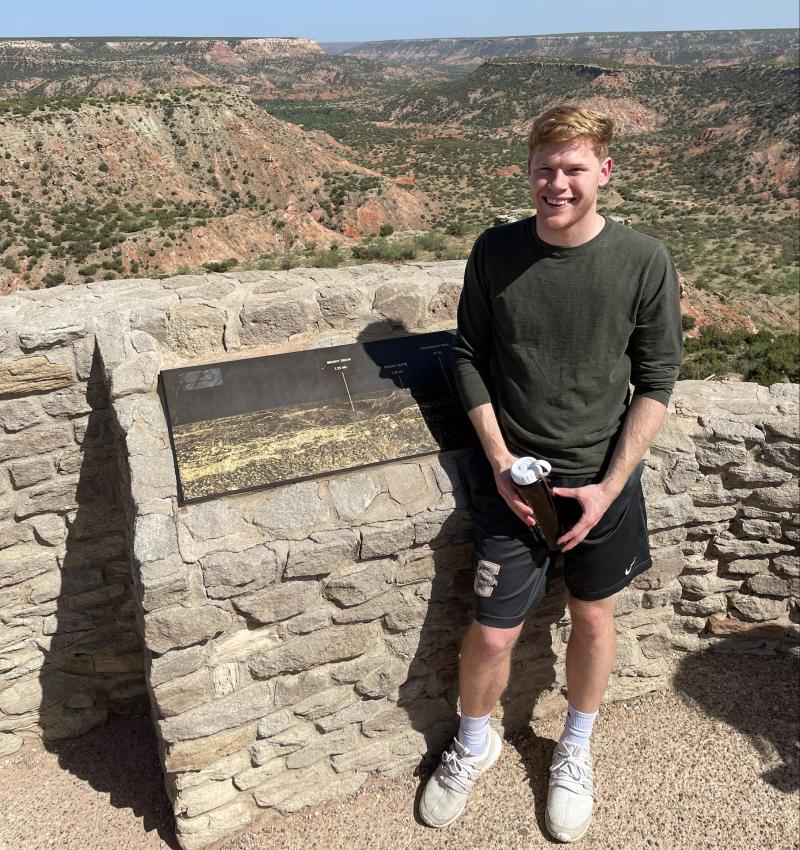
Zach attended a conference in Texas and spent time traveling through the panhandle to meet with agricultural workers.
by Zach Schwindt
The Nebraska Public Interest Law Fund (NPILF) provides a limited number of stipends to University of Nebraska College of Law students who secure unpaid public interest positions for the summer.
2L Zach Schwindt, a 2022 NPILF recipient, worked with Legal Aid of Nebraska's Agricultural Worker Rights Program and reflected on the experience below.
When a person thinks of an attorney, they imagine an individual sitting behind a desk reading through statutes, drafting complaints, or arguing in court. No one pictures an attorney driving and walking through the panhandle of Texas in 100° heat searching for agricultural workers. As a clerk with Legal Aid of Nebraska’s Agricultural Worker’s Rights Program, I traveled to Amarillo, Texas to train with Legal Aid of Oklahoma and the Texas Rio Grande Legal Aid office. I attended this conference to learn about relevant statutes, outreach strategies, and how to communicate and help those from different cultures. Part of this training involved traveling through the panhandle in search of agricultural workers from other countries to ensure they were receiving adequate employment protection and care. My first outreach stop was in the small city of Cactus, Texas where I interacted with workers from South Africa, Canada, England, Ireland, and Mexico. I quickly learned that law school could only prepare you to a certain extent and the practice of law can take different forms.
During my clerkship this summer, there was no typical day for me. My duties generally included researching case law or statutes, drafting documents for cases, and creating a resource guide summarizing pertinent statutes for the Program. However, it was also common to be traveling throughout the day. An important aspect of the clerkship was performing outreach. Outreach is how the Program finds those who have been mistreated while working in Nebraska.
There are Visa programs that permit foreign nationals to fill available agricultural positions in the United States, which is prevalent across Nebraska. To ensure these individuals were receiving the required protections, my supervisor and I would travel to numerous cities to visit the workers. We would provide informational pamphlets and have conversations about the workers’ experiences with their employer. Making these connections and supplying the workers with information was the best way to find those in need of assistance.
There were many obstacles I faced during this clerkship. Most of the foreign workers were from Mexico, and therefore Spanish was generally spoken during outreach. My supervisor was fluent in Spanish, while I hadn’t studied or practiced it since high school. Thus, this language barrier made it hard to follow all the conversations between us and the workers. This made it difficult for me to build personal connections and pick out anything concerning mentioned by a worker. Another battle I faced during the summer was learning to interact with individuals from so many different cultures. I have experience in working cross-culturally, but I had never interacted with such distinct groups. It was challenging figuring out how to get these workers to trust us, open up about their experience, and provide meaningful information about their employment. Out of all these challenges, however, the biggest was getting workers to understand that we were a resource for them. Many of these workers did not want to speak out against their employers because they wanted to continue working in the States. In addition to that, these individuals were from other countries and did not always know or understand we were trying to help them. It was essential to build relationships with them to break down these misconceptions and ensure them we were there for their benefit.
This experience taught me that the law can and must be practiced beyond an office or courtroom. Public interest work is not what most think of when they imagine the law, but it requires a constant dedication and drive to help others that isn’t seen in most areas of the legal field. There were nights in Texas where we were still driving through the panhandle at 11 p.m., and evenings in Nebraska where we’d visit four different cities after working a full day. Non-profit lawyers are always advocating for the vulnerable and have protected the rights of the disadvantaged for decades. I hope to have the passion and care that I witnessed this summer when I practice.